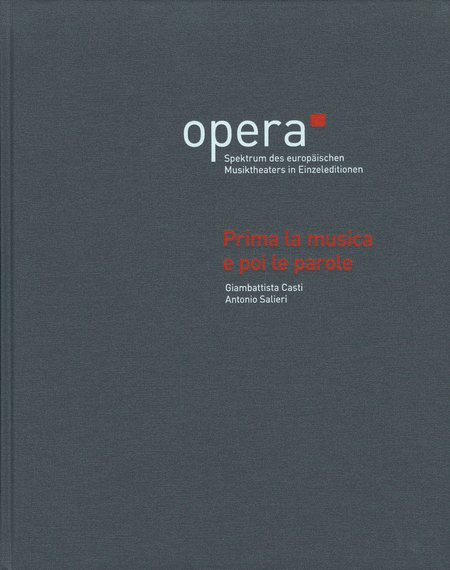Prima la musica e poi le parole
Divertimento teatrale in one act. Operetta for four voices
-
Ships in 1 to 2 weeks
Details
Description
SKU: BA.BA08811
Divertimento teatrale in one act. Operetta for four voices. Composed by Antonio Salieri. Edited by Adrian La Salvia and Thomas Betzwieser. This edition: Edition of selected works, Urtext edition. Linen. Spectrum of European Music Theatre in Separate Editions 1. Edition of selected works, Score, Critical commentary, USB flash drive. Duration 1 hour, 15 minutes. Baerenreiter Verlag #BA08811. Published by Baerenreiter Verlag (BA.BA08811).ISBN 9790006539840. 33.1 x 26.5 cm inches. Text Language: Italian. Preface: Betzwieser, Thomas. Text: Giambattista Casti.
A memorable musical competition commissioned by the emperor Joseph II took place on 7 February 1786 as part of a festival in the orangery of the Schönbrunn palace. A German Singspiel ensemble performed Mozart’s “Schauspieldirektor” whilst Antonio Salieri’s “Prima la musica e poi le parole” was performed by the Italian court singers and musicians. This charming opera satire belongs to the genre of “metamelodramma” in which the opera itself becomes the subject of the action. The people who are part of an opera production, for example the librettist, composer and prima donna, appear as characters on the stage and are presented in a humorous self-reflection. In this ‘theatre about theatre’ Salieri parodies the music from Giuseppe Sarti’s “Giulio Sabino” in his insert arias, thus playing on the music which was totally familiar with the audience of the time. By reflecting on the musical-dramatic style of that period and discussing whether ‘the word’ or ‘the music’ should take priority, this masterpiece is considered to be an early forerunner to Richard Strauss’s “Capriccio”.
The new edition of the score is published as part of “opera – Spectrum of European Music Theatre in Separate Editions”. There are several alterations regarding the libretto text, stage directions, articulation, ornamentation, etc. which have been incorporated into this newly engraved vocal score. Furthermore, all appendix numbers from the score which concern the quotations from Giuseppe Sarti’s “Giulio Sabino” have also been incorporated.
• Urtext vocal score based on the historical-critical hybrid score published as part of “opera – Spectrum of European Music Theatre in Separate Editions” edited by Thomas Betzwieser (music edition) and Adrian La Salvia (text edition).
• Original Italian libretto with singable German translation
• Comprehensive bilingual foreword (Ger/Eng) on the genesis and reception of the work, on metamelodramma and intertextuality etc.
• Includes an extensive appendix to the quotations taken from Giuseppe Sarti’s “Giulio Sabino”
• Idiomatic piano reduction
About Barenreiter Urtext
What can I expect from a Barenreiter Urtext edition?
MUSICOLOGICALLY SOUND
- A reliable musical text based on all available sources
- A description of the sources
- Information on the genesis and history of the work
- Valuable notes on performance practice
- Includes an introduction with critical commentary explaining source discrepancies and editorial decisions
... AND PRACTICAL
- Page-turns, fold-out pages, and cues where you need them
- A well-presented layout and a user-friendly format
- Excellent print quality
- Superior paper and binding

 Share
Share